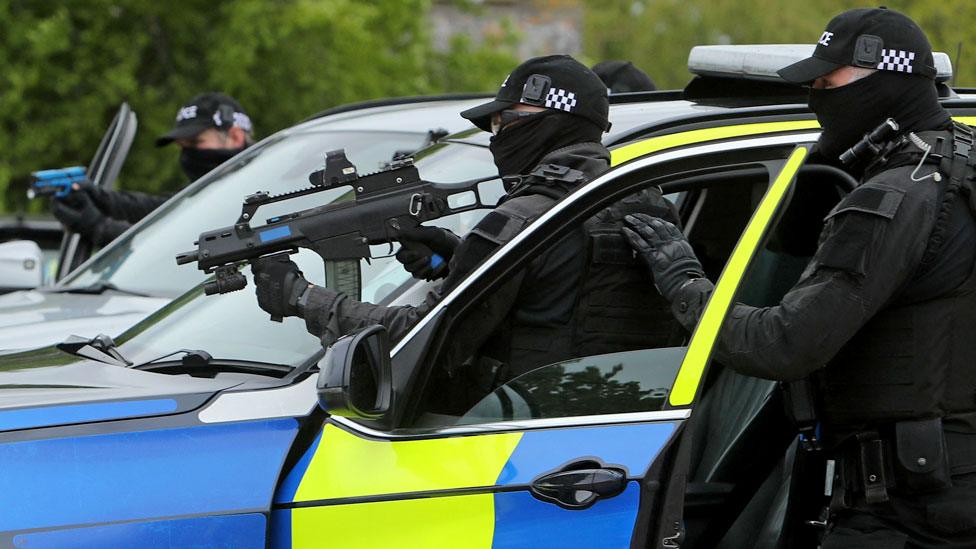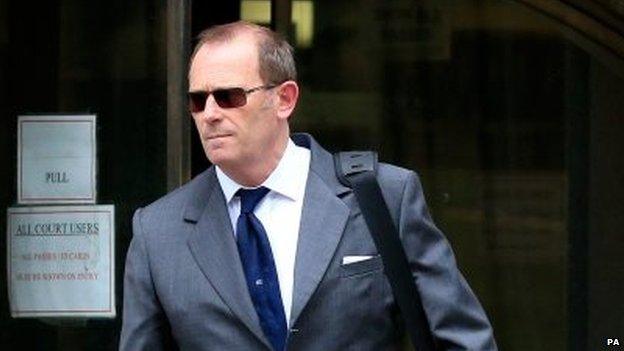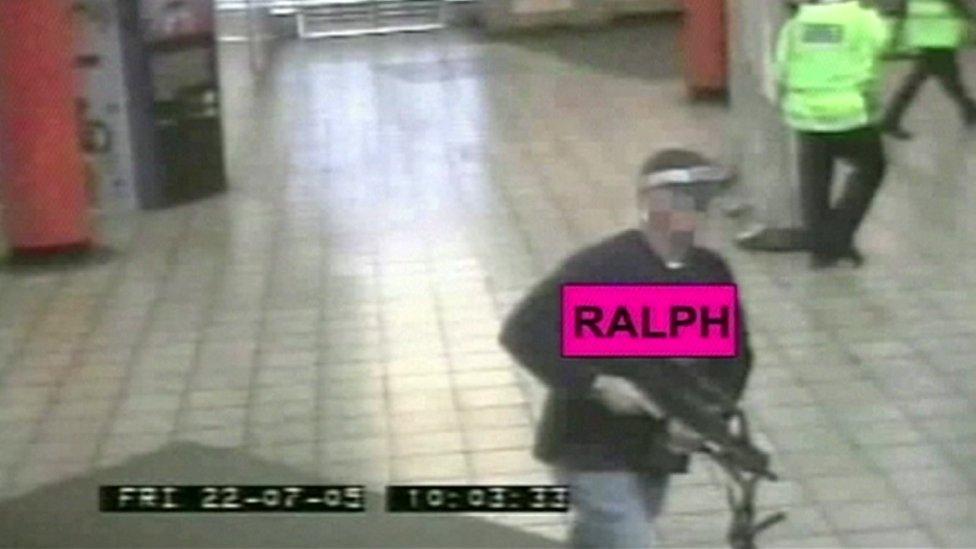Firearms police: What's the law when officers open fire?
- Published

File photo shows firearms officers during a media demonstration ahead of the G7 Summit in Cornwall, 2021
The charging of an armed police officer with the alleged murder of Chris Kaba in London has sparked alarm among his colleagues - but at the source of this row is a deeper and longer-running dispute over the law.
Any change in that law will lead to accusations from critics that officers will be harder to hold to account if things go wrong.
Under the law, every armed police officer is personally responsible for their actions. Officers cannot use more force than is necessary to neutralise a threat.
A superior officer cannot tell a police officer to pull the trigger - nor can there be a pre-emptive tactical decision to shoot a suspect whatever the circumstances.
So if an officer shoots, when is that considered a justifiable decision, and when is it a crime?
It comes down to the law of self-defence.

Anthony Long: The retired police officer had 30 years' experience of handling firearms
Honestly held belief
Put simply, a police officer can open fire if they honestly believe that they need to shoot to protect themselves, their colleagues or the public. If that belief was honestly held, they are not guilty of a crime.
What if the officer was mistaken?
The 2015 trial of former firearms officers Anthony Long turned on this issue.
Ten years earlier, the experienced firearms officer was part of a specialist team tracking a very dangerous criminal gang including a man called Azelle Rodney.
They ultimately surrounded the gang's car and in the moments that followed, Rodney, who was inside the car, was shot six times. You can see from the video of the incident how quickly things happened.
The prosecution submitted video reconstruction evidence as part of the trial
The officer told his trial that he honestly believed he had no choice but to fire. He said he believed the suspect had been ducking down to pick up a firearm. He said all of the suspect's body language told him that he and his colleagues were in imminent danger.
Prosecutors, however, said that the officer had shot so quickly he could not have assessed the criminal's intentions.
Three guns were found in the car - but none in Rodney's hands.
The Old Bailey judge told the jury to ask themselves this question: "Have the prosecution made us sure that, at the time that he fired his first shot, the defendant did not genuinely believe (even if mistakenly) that he and/or others were about to be fired at, so that he needed to defend himself and/or others by firing at Mr Rodney?
"If the answer is no, then you have reached a verdict of not guilty."
Mr Long was found not guilty of murder. What had mattered, in law, was his honestly held belief at a moment of maximum threat.
Terrible mistake - but not a crime
The terrible death of Jean Charles de Menezes - also in 2005 - came down to a terrible mistake, but not one that any individual officer could be found in law to be responsible for.
Mr de Menezes was shot dead by officers on the London Underground. They believed he was a suicide bomber on the run. He was in fact an electrician going to work.

CCTV footage showed Jean Charles de Menezes being pursued by armed officers at Stockwell underground station
The circumstances of the disastrous operation, revealed in the later inquest, showed that not only did the teams on the ground believe he was genuinely the suspect, but their commanding officers thought this too.
Why do some police object to the law?
The answer comes down to the non-criminal law. These are the rules that apply in civil cases, such as when someone sues for damages.
Back in 2015, Jermaine Baker was shot dead outside a London court after being implicated in a plot to free two criminal suspects from custody.
The police had intelligence that Baker and others would be armed.
Officer W80 - one of the armed team on the ground - believed the suspect was reaching for a gun and that he had to open fire to defend himself and others.
Jermaine Baker did not have a gun - but an imitation firearm was found in the car.
The police watchdog investigated whether W80 was justified in shooting.
Without getting too technical, it had to use the rules of civil law, not the criminal test, to consider whether the shooting had been wrong. It concluded that while W80 honestly believed he had to shoot, that belief had been legally unreasonable.
It ordered that he should face a gross misconduct hearing in which he could lose his job.
The row over that decision went all the way to the Supreme Court.
In July, five of its judges upheld the police watchdog's thinking - a decision that means other officers could similarly face disciplinary action, even if they would never be prosecuted for a crime. That rule is now fixed unless Parliament changes it.
Many officers now want the burden of proof for any kind of finding of wrongdoing to always be the criminal test of what the officer honestly believed in the split second they chose to act.
Police chiefs say only using the criminal burden of proof would end confusion.
In the case of Anthony Long, the inquiry into Azelle Rodney's death concluded he had been unlawfully killed - a finding a criminal court jury later did not support.
If you think that sounds complicated, you're right - it is. And if the home secretary wants to implement the changes the police are seeking, it would require votes in Parliament. And all of that takes time.
